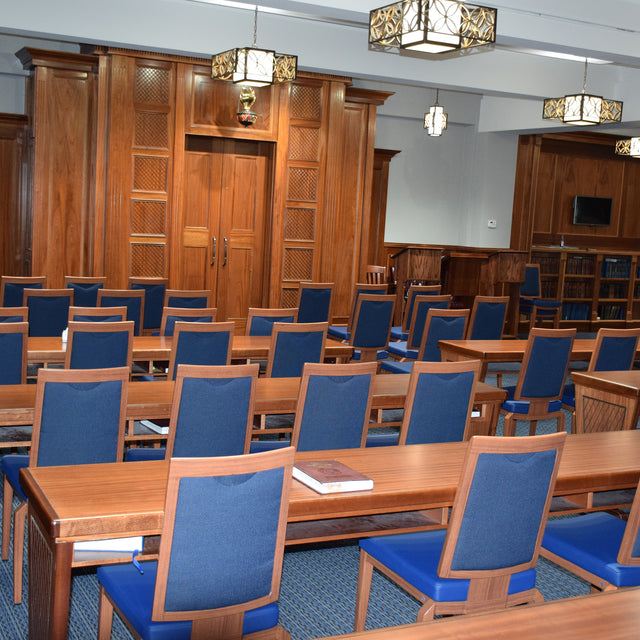Must-Have Shul Furniture Pieces for Comfortable Seating
In any place of worship, creating a comfortable and inviting environment for congregants is essential. Synagogues, also known as shuls, are no exception. The seating arrangements within a shul play a significant role in enhancing the overall worship experience for attendees. From fostering a sense of community to accommodating diverse needs, selecting the right shul furniture pieces is crucial. In this blog post, we will explore the must-have shul furniture pieces that contribute to comfortable seating, fostering an atmosphere of reverence, connection, and unity.
The Must-have Shul Furniture Pieces
1. Shul Chairs: Merging Tradition with Comfort
Shul chairs are the cornerstone of comfortable seating within a shul. While adhering to the traditions and aesthetics of the faith, these chairs are designed with modern comfort in mind. The incorporation of ergonomic designs, supportive cushioning, and sturdy materials ensures that congregants can fully immerse themselves in prayer without discomfort. Shul chairs come in various styles, from classic to contemporary, allowing shuls to align their seating with their unique atmosphere.
2. Shul Folding Tables: Space Optimization and Versatility
Shul folding tables are incredibly versatile additions to the seating arrangement. These tables are designed to be easily folded and stored when not in use, making them perfect for events such as communal meals, study sessions, or social gatherings. By combining shul folding tables with comfortable chairs, the shul can transform its space to accommodate a wide range of activities, enhancing the sense of community and fellowship among congregants.
3. Shul Tables: Nurturing Connection and Engagement
Shul tables play a vital role in encouraging interaction among congregants. Placing tables strategically within the shul space provides a designated area for individuals to connect, share, and engage in meaningful conversations. These tables can also be utilized for placing prayer books, personal items, or ritual objects, keeping everything within easy reach during services. The inclusion of shul tables contributes to a sense of unity and camaraderie among the worshipers.
4. Pews and Benches: Embracing Tradition and Togetherness
Pews and benches have long been associated with religious worship, and shuls are no exception. These long seating arrangements foster a sense of togetherness, allowing families and friends to sit side by side. Pews and benches are often made from solid wood, ensuring durability and a connection to tradition. Adding comfortable cushions to pews and benches further enhances the seating experience, encouraging worshippers to focus on their spiritual journey.
5. Comfortable Cushions: Elevating Comfort and Focus
Comfortable cushions are a small yet significant addition to shul furniture. Whether placed on pews, benches, or shul chairs, these cushions provide much-needed padding during extended periods of sitting. Cushions come in various materials, such as foam, fabric, or memory foam, offering a personalized touch of comfort. By ensuring the physical well-being of congregants, comfortable cushions enable them to fully engage in the spiritual experience without distractions.
6. Prayer Chairs: Tailored Seating for Spiritual Connection
Prayer chairs are designed with the intricacies of prayer and meditation in mind. These chairs often feature built-in kneelers or footrests, allowing congregants to adopt various postures comfortably. Prayer chairs are lightweight and portable, making them versatile assets within the shul space. By incorporating these chairs, the shul caters to the individualized needs of its attendees, creating an environment conducive to focused worship.
7. Accessibility Seating: Inclusivity and Equal Participation
To uphold the values of inclusivity and equality, shuls should prioritize accessibility seating options. This may involve designated spaces for wheelchairs, seats with armrests for enhanced support, and wider spaces to accommodate mobility aids. By providing accessibility seating, the shul ensures that everyone, regardless of physical abilities, can fully participate in and contribute to the worship experience.
8. Reading Desks and Lecterns: Enhancing Participation and Engagement
Shul services often involve readings from sacred texts, and reading desks and lecterns facilitate this aspect of worship. These pieces provide a designated space for presenters to read and share, ensuring clear visibility for congregants. Reading desks and lecterns are available in various styles, from simple designs to ornate creations that complement the shul's aesthetics. By incorporating these elements, the shul encourages active participation and engagement in the service.
9. Personal Storage Compartments: Orderliness and Convenience
In a communal setting, maintaining order and organization is crucial. Personal storage compartments integrated into shul furniture allow attendees to keep their belongings secure during services. These compartments may include discreet shelves, hooks, or compartments beneath seats, reducing clutter and promoting a focused worship atmosphere.
10. Aisle Dividers: Guiding Flow and Preventing Congestion
In larger shuls, managing the flow of foot traffic is essential to ensure a smooth worship experience. Aisle dividers, whether functional partitions or decorative features, help guide the movement of congregants and prevent congestion. By maintaining clear pathways, the shul ensures that worshippers can navigate the seating area without causing disruptions.
11. End Tables and Cup Holders: Convenience and Focus
Small details like end tables and cup holders can significantly enhance the worship experience. End tables provide a convenient surface for placing prayer books, religious accessories, or personal items. Cup holders keep refreshments within reach, allowing congregants to stay hydrated without interrupting the service. These thoughtful additions contribute to comfort and focus during worship.
12. Proper Lighting: Illuminating the Spiritual Experience
While not furniture pieces themselves, proper lighting is integral to creating an inviting worship environment. Adequate lighting ensures that congregants can read texts, follow along with prayers, and engage in the service without straining their eyes. Warm and inviting lighting fixtures contribute to the shul's overall ambiance, fostering an atmosphere of reverence and tranquility.
13. Upholding Tradition with Customized Furniture
Customized furniture pieces offer a unique opportunity to blend tradition with modern comfort. Shuls can work with artisans to create furniture that incorporates traditional motifs, intricate carvings, and materials that resonate with the congregation's history. These bespoke creations not only provide functional seating but also serve as symbolic representations of the shul's identity and values.
14. Sustainable Seating Solutions: Stewardship and Responsibility
In an era of heightened environmental consciousness, opting for sustainable materials and practices in shul furniture is a commendable choice. Chairs and pews crafted from responsibly sourced wood or recycled materials reflect the shul's commitment to stewardship and responsibility. By choosing sustainable seating solutions, the shul aligns its values with the broader goal of caring for the planet.
15. Regular Maintenance and Upkeep: Preserving Comfort and Quality
Ensuring comfortable seating goes beyond the initial selection; regular maintenance is crucial for preserving the quality and appearance of shul furniture. Routine cleaning, repairs, and inspections extend the lifespan of the furniture, ensuring that congregants continue to have a comfortable and inviting space for worship. Prioritizing maintenance demonstrates the shul's dedication to providing the best possible experience for its attendees.
16. Engaging Professional Designers: Expertise in Creating Harmonious Spaces
For shuls considering a redesign or renovation, professional interior designers can provide invaluable expertise. These experts understand how to optimize space, select appropriate furniture pieces, and create an atmosphere that aligns with the shul's values and aesthetics. They offer insight into layout, color schemes, and furniture placement that contribute to comfort and spiritual enrichment.
17. Gathering Feedback and Adapting: Meeting Evolving Needs
The congregants' comfort and satisfaction should always guide decision-making. Gathering feedback through surveys or direct conversations provides insights for improvement. Adapting the seating setup based on congregational input ensures that the shul continually meets the evolving needs of its community, fostering a sense of ownership and engagement among attendees.
18. Balancing Aesthetics and Functionality: Creating a Cohesive Atmosphere
While prioritizing comfort, it's essential to maintain a balance between aesthetics and functionality. Shul furniture pieces should complement the shul's architectural style, color palette, and overall ambiance. Chairs, tables, and other elements should seamlessly blend into the space, enhancing both physical comfort and the spiritual experience.
Conclusion
Creating an environment of comfortable seating within a shul is a multifaceted endeavor that encompasses tradition, comfort, inclusivity, and design. Each piece of shul furniture, whether chairs, folding tables, or pews, contributes to a holistic worship experience. By thoughtfully integrating these must-have shul furniture pieces, a shul can cultivate an atmosphere of spiritual connection, community, and reflection. As congregational needs evolve, so too should the shul's commitment to providing seating that fosters both physical comfort and spiritual growth. Through the harmony of tradition, innovation, and inclusivity, shul furniture becomes a vessel through which worshippers can fully engage in their spiritual journey within the sacred walls of the shul.

